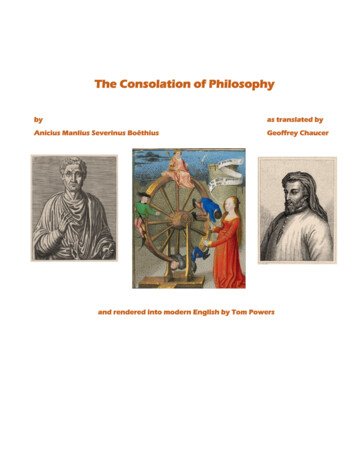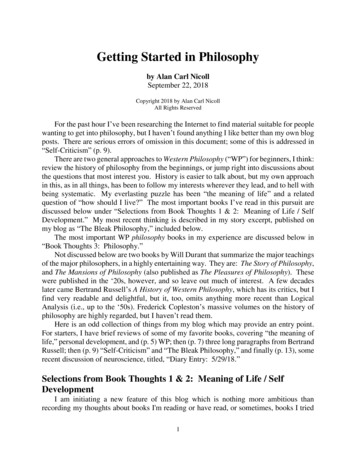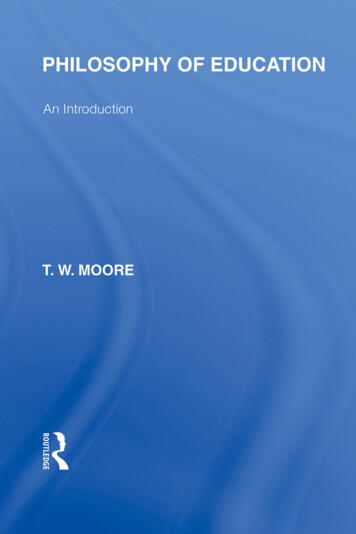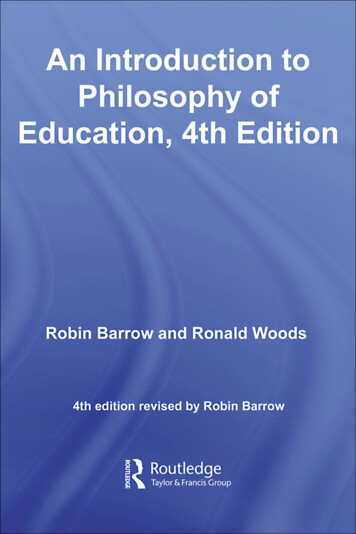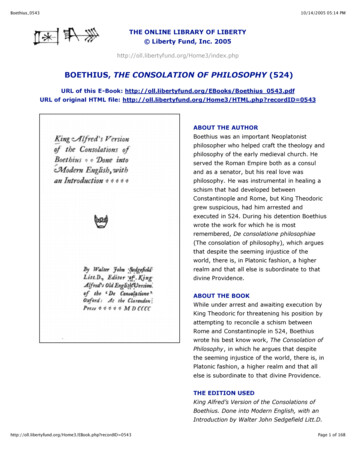
Transcription
Boethius 054310/14/2005 05:14 PMTHE ONLINE LIBRARY OF LIBERTY Liberty Fund, Inc. HIUS, THE CONSOLATION OF PHILOSOPHY (524)URL of this E-Book: http://oll.libertyfund.org/EBooks/Boethius 0543.pdfURL of original HTML file: http://oll.libertyfund.org/Home3/HTML.php?recordID 0543ABOUT THE AUTHORBoethius was an important Neoplatonistphilosopher who helped craft the theology andphilosophy of the early medieval church. Heserved the Roman Empire both as a consuland as a senator, but his real love wasphilosophy. He was instrumental in healing aschism that had developed betweenConstantinople and Rome, but King Theodoricgrew suspicious, had him arrested andexecuted in 524. During his detention Boethiuswrote the work for which he is mostremembered, De consolatione philosophiae(The consolation of philosophy), which arguesthat despite the seeming injustice of theworld, there is, in Platonic fashion, a higherrealm and that all else is subordinate to thatdivine Providence.ABOUT THE BOOKWhile under arrest and awaiting execution byKing Theodoric for threatening his position byattempting to reconcile a schism betweenRome and Constantinople in 524, Boethiuswrote his best know work, The Consolation ofPhilosophy, in which he argues that despitethe seeming injustice of the world, there is, inPlatonic fashion, a higher realm and that allelse is subordinate to that divine Providence.THE EDITION USEDKing Alfred’s Version of the Consolations ofBoethius. Done into Modern English, with anIntroduction by Walter John Sedgefield Litt.D.(Oxford: Clarendon Press, ecordID 0543Page 1 of 168
Boethius 054310/14/2005 05:14 PM(Oxford: Clarendon Press, 1900).COPYRIGHT INFORMATIONThe text of this edition is in the public domain.FAIR USE STATEMENTThis material is put online to further theeducational goals of Liberty Fund, Inc. Unlessotherwise stated in the Copyright Informationsection above, this material may be usedfreely for educational and academic purposes.It may not be used in any way for profit.TABLE OF CONTENTSPREFACEINTRODUCTION§ 1. Wessex at Peace. Alfred’s Reforms.§ 2. His Zeal for Learning.§ 3. The De Consolatione Philosophiae of Boethius.§ 4. Boethius and his Fate.§ 5. Alfred’s Method of Translation.§ 6. Manuscripts of the Old English Boethius.§ 7. The Two Versions of the Lays of Boethius.§ 8. A list of Alfred’s notable comments and additions may be here given:§ 9. Later English Versions of the ‘Consolations.’BO E T H I U S , Book iii, metr. 2.Book iv, prose 2.Book iii, metr. 2.Book iv, prose 2.Book iv, prose 2.Book iv, prose 2.Book iv, prose 2.Book iv, prose 2.EndnotesSUMMARY OF CONTENTSBOOK ICH A P T E RS ordID 0543Page 2 of 168
Boethius 054310/14/2005 05:14 PMBOOK II.CH A P T E RS VII-XXIBOOK III.CH A P T E RS XXII-XXXVBOOK IV.CH A P T E RS XXXVI-XLBOOK V.CH A P T E RS XLEN D .TOKing Alfred’s Version of the Consolations of BoethiusPROEMBoethius and TheodoricTHE LAYS OF BOETHIUSPRELUDE(Not in BO E T H I U S .)LAYSI(Not in BO E T H I U S .) Cf. p. 1.IIBO E T H . i. metr. 1. Cf. p. 2.IIIBO E T H . i. metr. 2. Cf. p. 4.IVBO E T H . i. metr. 5. Cf p. 5.VBO E T H . i. metr. 7. Cf. p. 10.VIBO E T H . ii. metr. 3. Cf. p. 18.VIIBO E T H . ii. metr. 4. Cf. p. 25.VIIIBO E T H . ii. metr. 5. Cf. p. 33.IXXBO E T H . ii. metr. 6. Cf. p. 40.BO E T H . ii. metr. 7. Cf. p. 47.XIBO E T H . ii. metr. 8. Cf. p. 50.XIIBO E T H . iii. metr. 1. Cf. p. 54.XIIIBO E T H . iii. metr. 2. Cf. p. 60.XIVBO E T H . iii. metr. 3. Cf. p. 65.XVXVIXVIIXVIIIBO E T H . iii. metr. 4. Cf. p. 69.BO E T H . iii. metr. 5. Cf. p. 73.BO E T H . iii. metr. 6. Cf. p. 75.BO E T H . iii. metr. 7. Cf. p. 77.XIXBO E T H . iii metr. 8. Cf p. 80.XXBO E T H . iii. metr. 9. Cf. p. 87.XXIXXIIBO E T H . iii. metr. 10. Cf. p. 100.BO E T H . iii. metr. 11. Cf. p. 107.XXIIIBO E T H . iii. metr. 12. Cf. p. 115.XXIVBO E T H . iv. metr. 1. Cf. p. Book.php?recordID 0543BO E T H . iv. metr. 2. Cf. p. 128.BO E T H . iv. metr. 3. Cf. p. 127.BO E T H . iv. metr. 4. Cf. p. 133.Page 3 of 168
Boethius 054310/14/2005 05:14 PMXXVIIIXXIXXXXXXXIBO E T H . iv. metr. 5. Cf. p. 139.BO E T H . iv. metr. 6. Cf. p. 142BO E T H . v. metr. 2. Cf. p. 159.BO E T H . v. metr. 5. Cf. p. 161.NOTESBOETHIUS, THE CONSOLATION OF PHILOSOPHY (524)TO THE REV. PROFESSOR W. W. SKEATL I T T .D ., D .C .L ., L L .D ., P H .D . T H I S BO O K I SGRATEFULLYDEDICATEDPREFACETH E preparations for adequately commemorating the forthcoming millenary of King Alfred’sdeath have set going a fresh wave of popular interest in that hero. Lectures have been given,committees formed, subscriptions paid and promised, and an excellent book of essays byeminent specialists has been written about Alfred considered under quite a number of aspects.That great King has himself told us that he was not indifferent to the opinion of those thatshould come after him, and he earnestly desired that that opinion should be a high one. Wehave by no means forgotten him, it is true, but yet to very many intelligent people he is, touse a paradox, a distinctly nebulous character of history. His most undying attributes in thememory of the people are not unconnected with singed cakes and romantic visits in disguise tothe Danish camp. It is therefore difficult for many to realize that Alfred wrote books, copies ofwhich, written during his lifetime, are now lying in some of our great libraries. Of these booksall are interesting to us from the personal character impressed on them by the King—thePastoral Care, for instance, for its admirable preface containing Alfred’s observations on thestate of learning in the England of his day, and the Orosius for the valuable geographicalcontributions which he inserted in his version of the once famous historian. But there is one ofhis books that more than the others is instinct with a certain anonymously personal note suchas we look for in vain in English literature for hundreds of years after. This book is his versionof the Consolations of Philosophy of Boethius, the making of which was to Alfred a love’slabour. It satisfied his intellectual cravings and stimulated his uncultured but vigorous mind,and he resolved to give his still more unlettered lieges a share in the treat. So he turned it intohis own tongue, as the King of the West Saxons might be expected to do, in a large and royalway, scattering up and down the work such notes and comments as he judged needful. HisBoethius heads the roll of English philosophical writings; it likewise heads the roll of recordID 0543Page 4 of 168
Boethius 054310/14/2005 05:14 PMBoethius heads the roll of English philosophical writings; it likewise heads the roll of Englishtranslations. It is hoped that the modern English dress here given to the King’s best book willhelp to make him less an unsubstantial shadow for Englishmen of to-day, and more a real man,practical, right-feeling, and earnest beyond his generation.A few words on the method and aim of this modern version may be said here rather than inthe Introduction. The Anglo-Saxon text followed is that edited by the translator for the OxfordUniversity Press last year. The prose part is rendered quite literally, generally ‘word by word,’ asthe King says of parts of his own version. Thus the simplicity and directness of the original OldEnglish are kept. In the version of the alliterating verses, printed together after the prose, themetre of the original Old English has been retained as far as is allowed by the limitations ofmodern English, but literalness has not been thereby sacrificed. The result, I may hope, willgive a fair idea of the original, which itself is far from echoing the hammer-and-anvil lines ofthe best Old English song-smiths, as we see them at work in the Beowulf. The Introduction isintended to give the general reader what he may like to know about Alfred’s Boethius and hisliterary method in general, and the student of English literature will perhaps find interest in theselections from later English translations of the Consolations.It is now time for me to close this preface, first expressing my heartiest thanks to ProfessorYork Powell, who has kindly looked carefully through the proofs of the Introduction and portionsof both the prose and the verse, and has helped me generally out of his mature experience.CH RI ST ’S CO L L E G E , CA M BRI D G E , March, 1900.N.B.—The passages in the prose text which do not occur in the Latin original are printed initalics, but Alfred’s numerous omissions are not indicated in the text. For details, theIntroduction to the Oxford edition of the Old English Boethius may be consulted.INTRODUCTION§ 1. Wessex At Peace. Alfred’S Reforms.IN the year 878A .D .,on the conclusion of the negotiations begun with Guthrum at Wedmore,Wessex emerged unbeaten but sorely shaken from a life-struggle that had lasted many yearswithout intermission. Inch by inch the Scandinavian pirates had been driven back, and now theWest-Saxon king could boast of a broader realm than ever before had been his, and better still,a more united people. The first seven or eight years of his reign had been spent in camp or onthe march, fighting, pursuing, retreating, in the varying fortunes of the struggle; a busy time,with small leisure for thoughts or deeds unconnected with immediate and constant peril.Alfred’s early ambitions had perforce to sleep, while his people had enough to do to hold theirground against the invader, standing still or going back on the path of culture. Still, it isprobable that the harsh training king and subjects had gone through together in their dark dayswas after all a real though disguised benefit to both. They shared the memory of perils andhardships borne together, and must have come to understand and sympathize with each cordID 0543Page 5 of 168
Boethius 054310/14/2005 05:14 PMhardships borne together, and must have come to understand and sympathize with each otheras only those can do that have side by side faced a common danger for many months. And soAlfred would, when brighter days came, find ready to his hand ‘fitting instruments of rule,’ ashe himself calls them. He entered upon the herculean labour of building up and consolidatingthe shattered fabric of society and government with a deep sense of the responsibility involved,and a clear perception of the difficulties to be faced. But his keen enthusiasm for the workmade it seem easy, and carried him through it all with admirable success. Everything had to bedone, as a veritable chasm gaped between the present and the past. First of all, the laws of theWest-Saxon kings had to be copied afresh, amended, and published, and their honestadministration enforced, so that equal justice done between man and man might smooth theway for the arts of peace. The citizen army had to be organized against a possiblerecrudescence of the piratical raids, a fleet of ships had to be built, and London resettled andfortified. Agriculture could now be carried on in security, and the simple arts and manufacturesof that day needed careful fostering. The Church, sorely weakened and humiliated afterrepeated outrage on the part of the heathen and by neglect of her own distracted people, mustbe raised to her former high estate. Her bishops and priests must be put back in their cures,her monasteries endowed, and piety and learning again cherished.§ 2. His Zeal For Learning.For of all the many forms of activity into which Alfred plunged in his eagerness to make up forlost time, we are sure that, next to religion, the cause of learning lay nearest his heart. Hehimself had always loved it, its books and its bookmen, and he wanted his people to share hislove. He quite understood that before a nation can begin to advance along the road ofenlightenment and civilization it must be taught the elements of education; and we know fromhis own account into what a lamentable ignorance, not only the common people, but even theclergy had fallen. The words of the King on this subject are most instructive, and for thehistory of his times of prime authority. ‘The sacred orders,’ he says, ‘were once zealous inteaching and study. . . . Men used to come to England from other lands in search of wisdomand instruction, but now we should be obliged to get them from abroad if we wanted them. Soentirely was learning fallen away in England that there were very few on this side of theHumber who could understand their church services in English, or even turn a Latin letter intoEnglish; and I think there were not many beyond the Humber. There were so few of them thatI cannot call to mind a single one south of the Thames, when I succeeded to the throne. . . .Thinking over all this, I remembered also how I had seen, before the country was all ravagedand burnt, the churches throughout England standing full of treasures and books. There wasalso a great number of God’s ministers, but they had very little profit of their books, of which,not being written in their own tongue, they could make nothing.’One of Alfred’s first acts in furtherance of his educational schemes was, if we may believe thestory in Asser’s Life, the foundation of a court school, wherein he followed, consciously or not,the example of the great Frankish king whom he resembled in so many ways. It is interestingto note that Charlemagne had, like Alfred, much trouble in interesting his rough war-like noblesin his schemes for the spread of hp?recordID 0543Page 6 of 168
Boethius 054310/14/2005 05:14 PMin his schemes for the spread of education.As stated by himself, Alfred’s plan was that ‘all the sons of English free men, who could affordthe time, should be kept at their studies, while they were as yet of no use to the state, untilthey could read English with ease. Then those who were to continue their education and to bepromoted to a higher order should be taught Latin.’Alfred, again like Charlemagne, had the good sense to gather round him the best scholars hecould find, sending to other lands for them, as his own produced them no longer. The names ofthe little group of learned clerics that helped the King to such good purpose were—the twoMercians, Werfrith or Waerferth, Bishop of Worcester, and Plegmund, Archbishop of Canterbury;Grimbold, a Frankish priest, afterwards Abbot of Winchester; John, a priest from Old Saxony;and Asser, a Welsh monk. All of these, except the last, are mentioned by the King in thepreface to his translation of the Pastoral Care of Pope Gregory.With the co-operation of these scholars, then, Alfred took in hand the education of his people.Though hungry for knowledge, it is probable that he was at a disadvantage in his equipment forits pursuit. He doubtless had an education suitable to a king’s son when he was at Rome, andafterwards in England, but he assumed the reins of government at so early an age, and was soentirely absorbed in fighting the Northmen during the first years of his reign, that he cannothave had much leisure for keeping up or adding to his learning. Hence he could not fullyunderstand unaided the more difficult books written in Latin, the sole language of the learned inWestern Europe in his day. In the Life of Alfred, ascribed to Asser, we are told that one of hislearned men used daily to read aloud to the King passages from his favourite authors. Williamof Malmesbury, too, a later chronicler, who made use of early annals and other old sources,mentions how Asser used to explain to Alfred the harder passages met with in reading the Latintext of the De Consolatione Philosophiae of Boethius. Being aware that the knowledge of Latinwas wellnigh extinct among the clergy of his kingdom, and that to the common folk everyavenue to learning was barred, Alfred conceived, and about the year 886 began to carry out, aplan of translating into English certain well-known standard works which he judged best fitted togive in moderate compass a good plain fund of knowledge to the Englishman of his day. Theseworks, to use the King’s words, were ‘such books as are the most needful for all men to know.’The modern reader should remember that a man who had mastered ten Latin books in theninth century in England would have been accounted well read, and a knowledge of thecontents of fifty would have amounted to encyclopaedic learning. Alfred’s choice fell upon thefollowing works:—1. The Universal History of Orosius, written early in the fifth century, being a compendium ofthe history of the world, written from a Christian point of view.2. The History of the English Church by the Venerable Bede, containing the history of theEnglish from their conquest of Britain up to the end of the seventh century, chieflyecclesiastical, enlivened with accounts of saints and miraculous occurrences.3. The Dialogues of Pope Gregory the Great, a popular book, describing the lives and miraclesof Italian saints, and treating of the life of the soul after ecordID 0543Page 7 of 168
Boethius 054310/14/2005 05:14 PMof Italian saints, and treating of the life of the soul after death.4. The Pastoral Care or Rule of the same Gregory, a practical manual of the duties of theclergy.5. The De Consolatione Philosophiae of Boethius.6. The Soliloquies of St. Augustine.Of these books the History of Orosius, the Consolation of Philosophy, the Pastoral Care, and theSoliloquies were put into English by the King himself. The Dialogues of Gregory were perhapstranslated by Bishop Werfrith at Alfred’s suggestion, and it is probable that the English versionof Bede’s Ecclesiastical History in its original form was also the work of one of the King’slearned priests.§ 3. The De Consolatione Philosophiae Of Boethius.By far the most important of these works was the famous treatise of Boethius. It was thephilosophical vade-mecum of the Middle Ages, and countless scholars during a thousand yearsknew little else of abstract reasoning save what they found in its pages. The influence that itexercised on the expression of abstract thinking during many centuries is hardly conceivable byus moderns, who can range freely over the best of ancient classical literature and wield aphilosophical vocabulary ready made for us. Its influence and popularity, indeed, as a book ofpractical piety, can only be compared with that of the later Imitation of Christ, and the earlierCicero’s De Officiis. Hundreds of manuscripts of it are still to be found in dozens of libraries,some of them going back to the tenth century; and it was one of the first books printed inEurope. Wherever the rude tongues of mediaeval Europe began to be articulate in prose,versions of the De Consolatione Philosophiae in the vernacular appeared. Of these earlytranslations Alfred’s was the first, and it was followed after the lapse of about a hundred yearsby a literal rendering into the Alemannic dialect of the Old High German language made at thefamous monastery of St. Gall by the monk Notker.To the eleventh century belongs a fragment of a manuscript now in the Public Library ofOrleans containing part of a free rendering or imitation in old Provençal. In the course of thethirteenth and early fourteenth centuries there appeared four versions in French, the first bythe famous Jehan de Meun, who dedicated it to Philippe le Bel. In England no less a poet thanGeoffrey Chaucer made a prose translation. He was followed by nearly a dozen others in thefollowing centuries, including Queen Elizabeth, and the last English version was published aslate as the year 1897. We have said nothing, be it noted, of Italian, Spanish, and Greekversions, all of which had begun to appear before the end of the fifteenth century. Othertongues have also done their share in popularizing the Consolations. It has frequently beenannotated and imitated, and it has comforted hundreds in their day of affliction. Our own SirThomas More had it with him in prison, and even wrote an imitation of it. Leslie, Bishop ofRoss, sent an imitation of it to his royal and captive mistress in 1572. Its influence on Europeanliterature has been immense. Traces have been found in the ancient English poem of ?recordID 0543Page 8 of 168
Boethius 054310/14/2005 05:14 PMliterature has been immense. Traces have been found in the ancient English poem of Beowulf.Chaucer’s poems are steeped in it. Gower, Lydgate, and Spenser drank inspiration at thisfountain, as the author of the Roman de la Rose in France, and the greater Dante andBoccaccio in Italy had done in their day.The sad surroundings under which the Consolation of Philosophy was written have ever found aresponsive chord of sympathy in the hearts of the oppressed, and never more readily than inthose turbulent times when the great ones of the earth were liable to be reft in a day of rankand honours at the nod of a capricious tyrant.§ 4. Boethius And His Fate.Let us now glance at the life of the author of this classic of the Middle Ages, the man whomGibbon styles ‘the last of the Romans whom Cato or Tully could have acknowledged for theircountryman.’About 400 years before King Alfred wrote, Theodoric, King of the Ostrogoths, starting fromWallachia, led a host of his folk over the Alps, and overthrowing Odovacar (Odoacer) reignedover Italy in his stead. Theodoric’s rule for many years was just and impartial, neither undulyoppressing the orthodox nor favouring those of the Arian heresy to which he himself belonged.He also respected the Imperial traditions, so that the Roman Senate continued to exercise atleast a show of its old functions.Among the eminent Romans of the time one was marked out for high honour by the new ruleron account of his high descent, vast wealth, and remarkable ability. Amicius Manlius SeverinusBoethius, who was born about 480A .D .,traced his origin to families powerful even under theRepublic. His wife Rusticiana was a daughter of Symmachus, a nobleman of great connexionsand estate. Boethius rose from one honour to another, being Consul in 510, and again in 522 inconjunction with his two young sons; and at length he came to be Head of the Senate, themost dignified position to which a Roman subject could attain. Contemporary historians tell usin what repute Boethius was held by all right-thinking men as well as by Theodoric, and how helaboured to lay bare the corruption and misgovernment of the Roman officials. His enemieswere consequently numerous, and they plotted his downfall.After years of beneficent rule, Theodoric suddenly developed signs of intolerance. He sent PopeJohn the First on a humiliating embassy to Justin the Emperor of the East at Constantinople,and on his return cast him into prison, where the old and feeble pontiff soon died. Theodoricwas now in the mood to listen to charges made by the foes of Boethius. Accused of beingconcerned in a conspiracy against his imperial master, the noble Roman defended himself withthe eloquence for which he was famed, but in vain. He was sentenced by the Senate toimprisonment, Theodoric still wishing to keep up an appearance of legality, and was confined ina dungeon at Ticinum. There, when his property had been confiscated, and after many monthsof imprisonment, he was, as we are told, tortured and put to ecordID 0543Page 9 of 168
Boethius 054310/14/2005 05:14 PMThose of his contemporaries whose writings have reached us, such as Priscian, Cassiodorus, andEnnodius, regarded Boethius as decidedly the most able and learned man of his day. He wasdeeply versed in the works of the Greek philosophers, some of which he turned into Latin andannotated for the use of his countrymen. It is certain that for centuries after his death themediaeval schoolmen knew Aristotle almost solely through the translations and commentaries ofBoethius. He had also a remarkable talent for mathematics, science, and practical engineering,and his work on music remained till last century the chief text-book on the subject at Oxfordand Cambridge. After his death Boethius came to be regarded by the Church of Rome as amartyr for the orthodox faith, and was canonized as St. Severinus. Many works on doctrinaltheology have been attributed to him, but modern scholars are not agreed as to his authorshipof them, nor even as to his having been a Christian at all. His most important and authenticwork, the De Consolatione Philosophiae, contains nothing from which the Christianity of itsauthor could be positively inferred, for it bases its philosophy entirely on the old systems ofAristotle, the Stoics, and the Neo-Platonists.§ 5. Alfred’S Method Of Translation.Such was the man who wrote the famous book which King Alfred set himself to make known tohis people. That it was a task after the English monarch’s own heart we may well believe. Thesplendid career and the wretched end of the last great Roman must have deeply impressedAlfred, who had himself known adversity, and was far from sure that his present heyday wouldlast.But the task of translation, though congenial, was difficult. In the first place, Alfred’s knowledgeof Latin can hardly have sufficed to give him an exact idea of the contents of a book whosestyle was modelled on the old classical writers of Rome, and differed widely from the crudeLatin written by the learned monks in the ninth century. This difficulty the King surmounted, aswe have already noticed, by having Asser read out the Latin text and explain it to him; and thisis confirmed by an examination of Alfred’s version, which in many parts bears the marks ofhaving been written from a recent recollection of the Latin rather than directly from it. TheKing’s version makes no attempt to imitate the artificial and involved periods of Boethius; hewas content to write so as to be ‘understanded of the people,’ and in this he succeeded, for hisEnglish, though devoid of art and often inelegant and rambling, is clear enough as to thesense. It is probable that Alfred wrote as he spoke, for he could have found but little proseliterature in English fit to form his style upon. Certain parts of the Vulgate and the Book ofPsalms and a number of prayers had been Englished, as the Life informs us; but beyond theseit is likely that no prose of a literary character existed in West-Saxon. All previous literary effortin English had taken the form of verse, which chiefly flourished north of the Humber; and wehave the curious, but not isolated, spectacle of a noble and expressive poetry co-existing with arude, faltering, barely articulate prose, as we can see it in the old charters which have comedown to us. In the process of transferring the ideas of Boethius into English of the ninthcentury a certain loss was inevitable. This Alfred doubtless realized, and from the first resolvedto attempt no more than to give the general sense of his original, now keeping fairly close tothe Latin, now being content to find a simple expression for ‘dark words’; here omitting ordID 0543Page 10 of 168
Boethius 054310/14/2005 05:14 PMthe Latin, now being content to find a simple expression for ‘dark words’; here omitting whathe judged of less moment for the end he had in view, there making additions of his own. And itis just these additions that are the most interesting part of the King’s version. In them we seehim in the capacity of author, and can make a comparison between the ideals he himself hereputs before us and his success in realizing them as recorded in the pages of history. In thisconnexion we may note that the annals of the West Saxons, perhaps previously written inLatin, were in the latter years of Alfred’s rule recorded in English, probably by the King’s orders,and the events of his reign were described in language of considerable vigour, with which it isinstructive to compare the prose of the royal writer himself. These annals form the firstinstalment of the famous Anglo-Saxon Chronicle, which was continued in various monasteries,till the last version, the Peterborough Book, ends with the joyful accession of Henry II.Thus King Alfred may be regarded as the first known writer of English literary prose. AbbotÆlfric, about a century after, recognized his debt to the King, saying that in his day ‘there wereno other godly books in the English tongue save the books that King Alfred skilfully translatedfrom Latin into English.’ Ælfric formed himself consciously on the style of the King, and in hishands English prose became smoother and clearer, more elegant, and more suited to theexpression of shades of thought.It is now time to see how the English King went to work in turning the Consolations ofPhilosophy into his own tongue. A glance over his version will at once show that it is very farfrom being even a free translation of the original work. Alfred evidently realized that a literalrendering, such as we find in his version of the Pastoral Care, would be a difficult task forhimself, and would be largely unintelligible to the people for whom it was intended. So heresolved to omit what seemed to him unessential, or too hard to translate, or too stiff for plainmen’s comprehension, and he did not hesitate to amplify where he thought a fuller treatmentneeded. Thus at the very beginning of the work he supplies a historical Introduction, and boldlytransposes and condenses the first few sections of the Latin; a treatment to which heoccasionally resorts throughout the book, particularly at the end. One is soon struck in readingAlfred’s version by the large number of explanatory notes inserted in the text. The King watcheshis chance, and explains allusions, mythological, historical
wrote the work for which he is most remembered, De consolatione philosophiae (The consolation of philosophy), which argues that despite the seeming injustice of the world, there is, in Platonic fashion, a higher realm and that all else is subordinate to that divine Providence. ABOUT THE B





